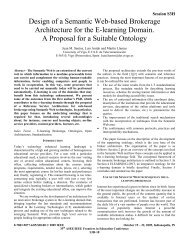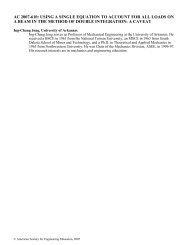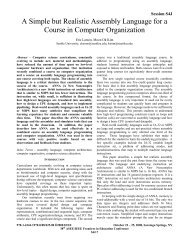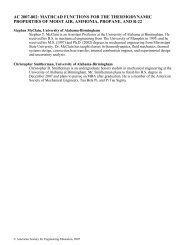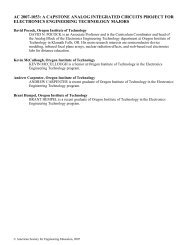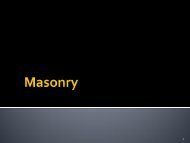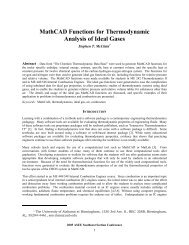AC 2007-514: UNIVERSITY OF ARKANSAS SCIENCE ...
AC 2007-514: UNIVERSITY OF ARKANSAS SCIENCE ...
AC 2007-514: UNIVERSITY OF ARKANSAS SCIENCE ...
You also want an ePaper? Increase the reach of your titles
YUMPU automatically turns print PDFs into web optimized ePapers that Google loves.
University of Arkansas Science Partnership Program<br />
Program Goal<br />
The goal of the Science Partnership Program at the University of Arkansas is to establish<br />
and operate summer institutes and follow-up training for 38 middle and junior high school<br />
science teachers in grades six through eight from selected Northwest Arkansas Educational<br />
Renewal Zone partnership schools. Specifically, the Science Partnership Program aims to serve<br />
teachers whose student populations are high poverty, high percent of English Language Learners<br />
and/or whose schools are in some phase of school improvement. These professional<br />
development activities provide teachers with experiences that lead them to value and use<br />
curricula effectively, based on scientific research, aligned with challenging state academic<br />
content standards, and are objective-centered, experiment-oriented, and concept and contentbased.<br />
Program Objectives<br />
1. Participating science teachers experience hands-on lab activities that are objectivecentered<br />
and experiment-oriented.<br />
2. Participating science teachers incorporate new hands-on laboratory activities learned<br />
during the Summer Institute and Follow-Up Activities to better plan for student learning.<br />
3. As a result of participation in the Partnership Program, science teachers will change their<br />
classroom practices so that student performance in science is increased.<br />
Research Base<br />
The literature in our research base reflects professional development needs of highlyqualified<br />
teachers and the instructional strategies that best address student learning needs.<br />
Harvard researcher Christopher Jencks and his colleagues concluded that test scores are<br />
determined by factors that schools do not control. The vast majority of differences in student<br />
achievement can be attributed to factors like the student’s natural ability or aptitude,<br />
socioeconomic status, and home environment . 8 Wright et. al. indicate the opposite is true and<br />
have noted that the individual classroom teacher has the greatest effect on student achievement. 9<br />
The implication of this study is that more can be accomplished by improving the effectiveness of<br />
teachers. From the results of their research, Marzano, et al. identified nine high-yield<br />
instructional strategies. 10 Teachers will improve their ability to utilize many of those strategies<br />
through the incorporation of the lab experiences.<br />
Dr. Ruby K. Payne states that students from poverty are coming to school not only with a<br />
lack of concepts, but more importantly, with a lack of cognitive strategies. She argues students<br />
need to exhibit five skills during the lesson: Use planning behaviors, control impulsivity, use<br />
evaluative behaviors, explore data systematically, and use specific language. She argues that a<br />
lesson requiring these five skills would result in improved cognitive strategies, discipline and<br />
achievement. 11 The hands-on laboratory experiences of the Science Partnership provide the<br />
opportunity for students to practice these skills. Reuven Feuerstein argues that between Jean



